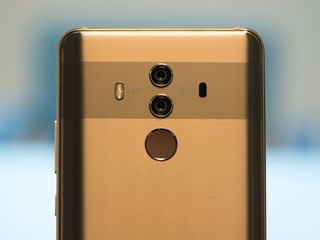The U.S. government's beef with Huawei isn't really about phones

In case you missed it this week, the heads of the FBI, NSA, CIA, and others recommended that we (meaning you and me and all consumers in the U.S.) stop using products from Chinese companies Huawei and ZTE. None of the speakers had any explicit reasons why we should heed their advice, but FBI head Christopher Wray offered this non-answer when pressed for one.
We're deeply concerned about the risks of allowing any company or entity that is beholden to foreign governments that don't share our values to gain positions of power inside our telecommunications networks. That provides the capacity to exert pressure or control over our telecommunications infrastructure. It provides the capacity to maliciously modify or steal information. And it provides the capacity to conduct undetected espionage.
While this doesn't address why consumers should stop buying phones from any company, it does offer the real reasons the U.S. is worried about Huawei in particular.
Number 3 tries harder

Huawei is the third largest smartphone manufacturer in the world behind Samsung and Apple. It is also the ninth largest technology company (by revenue) worldwide with 180,000 employees and an average annual revenue of $78.8 billion. In other words, Huawei is as "big" a company as Microsoft. That's good news for Huawei, and usually seeing a company move up the ladder to challenge the market leaders is good for consumers, too. Officially, Huawei is a subsidiary of Huawei Investment & Holding Co., Ltd. in Shenzhen, China and that's where the real issues the U.S. has with Huawei start.
Huawei is big and China's government is big and together they scare U.S. officials.
Unofficially, everyone thinks the Chinese government is in control of Huawei. While I'm not an expert on foreign affairs or the history of the Chinese Communist Party, I am smart enough to know that the Chinese state surely does have a financial interest in one of the biggest companies inside its border. The chance that the state has a controlling interest in Huawei doesn't surprise me, either. There has been no evidence offered, and not surprisingly there isn't much on the public record to clear things up, so we have to assume that it could be true. Intelligence agencies, as well as economic agencies and trade officials, have a problem with this. A big problem for several key reasons.
Some backdoors are more important than others
I'm also not an intelligence official, but that does give me the freedom to be frank about why the U.S. might be concerned with Huawei gaining a significant foothold in the States. Economically, it means money is going back to China, and right now our government has a love-hate relationship with the world's fastest-growing economy. It (meaning the U.S. government) does not want to see a Chinese company gaining any steam using American dollars and especially one that has strong Chinese government ties. That's how global politics work — you want to be at the top and be strong enough on all fronts to stay there forever.
A backdoor in your phone is bad but a backdoor on a network switch on a company like Sprint's network is a lot worse.
From an information technology and security standpoint, the worries of Huawei being an arm of the Chinese state brings some serious concern. Not because Huawei makes phones that are worth buying and has designed a model Americans will love, but because Huawei also makes enterprise-grade network hardware that works well and is cheap. That's the kind of stuff an American business will want to buy when the bottom line matters more than anything else, and that describes almost every American business. Having a company you suspect of being part of a semi-hostile government building the equipment the country's network infrastructure is built upon is terrifying to every U.S. spy agency.
All our important and sensitive information travels across the internet infrastructure. So does sensitive and important information from the NSA, or CIA, or FBI. Those agencies have to communicate just like we do. Certain government networks are hardened and completely isolated from any other network, but this information still has to pass hands and can touch the public infrastructure from time to time. It's surely heavily encrypted on multiple layers, but it's still not something the U.S. wants China to have. If Huawei has built methods for China to intercept any of this information, a potentially critical situation is born.
Be an expert in 5 minutes
Get the latest news from Android Central, your trusted companion in the world of Android
The NSA and the rest of the three-letter intelligence agencies aren't worried that Huawei is spying on us via a backdoor in a phone. They are worried that Huawei is spying on them through equipment that powers the internet.
Having a company you suspect of being part of a semi-hostile government building the equipment the country's network infrastructure is built upon is terrifying to every U.S. spy agency.
And they should be. That is, after all, one of their primary objectives. The controversial actions these agencies have taken make headlines, but day-to-day, week after week, employees at the NSA or CIA are there to do their duty to keep us safe. We might not agree with their idea of "safe", or how they go about their duties, but until they are changed things are what they are. And that means there is always going to be information that's classified and secret, someone will need to send that sort of information to someone else, and it may come in contact with equipment made by Huawei. If that equipment is compromised by China, there is a valid concern there.
Back to the phones. Having everyone in the U.S. rush out and buy a Mate 10 Pro, making Huawei richer (and putting a backdoor in every American's hands according to U.S. spooks and their bosses), isn't going to make trade officials happy. Having AT&T and Sprint and Level 3 and RCN and every other company that provides the U.S. internet infrastructure use potentially compromised equipment from a country that is in all but name an enemy of the state makes intelligence officials very concerned.
So what the hell should we do?
Spies gonna spy and corporations gonna corporate. There's not much a normal person who just wants to get their money's worth when they buy a new phone can do about that. Continue to vote, both at the ballot box and with your wallet, to try and shape the country the way you think it should be. All this aside, we can and should be concerned that we're making the right decision when we buy a phone. Nobody wants a phone that spies on them, and nobody deserves to get stuck with one.
I'll come out and say it plainly: I do not think the Chinese government, or any other entity, has placed a backdoor in any Huawei phone that would enable it to steal your data.
Huawei clearly responded to this latest accusation saying their phones and networking equipment is sold worldwide and "poses no greater cybersecurity risk than any ICT vendor" and there is no reason to doubt its word when it comes to its phones. In fact, there is some evidence that supports Huawei here. There are "rules" in place when a foreign country wants to sell electronic or connected products inside the U.S. and Great Britain. The public isn't privy to the exact details, but there is a rigorous inspection when a device is able to transmit encrypted data to make sure these rules are followed. Huawei has apparently been found to be following them as you can buy their products both here in the states and in Great Britain.
Further (but even more circumstantial) evidence is that plenty of people already have a Huawei phone and some of those people are the type who can monitor what their phones are sending and where it is going. So far, we've heard nothing to make me think Huawei is sending private data back to China or is building a bot-net to terrorize Americans over the internet. If Huawei was doing anything fishy with our data, Reddit would know and Reddit would be on fire.
I'm not saying you should take my word over that of FBI Director Christopher Wray. I take my word over his, but can't ask you to do the same. But I can ask you to consider one thing: we have been offered zero proof that buying a Huawei phone is a bad idea. Not a lick. Like you, I read multiple articles and news stories about the Senate Intelligence Committee testimony and I think ZDNet's Matt Miller says it the best.
As for myself, I will continue to use the Huawei Mate 10 Pro until there is evidence that shows I should be concerned.
But you can't let me make that decision for you. Make sure you're informed and choose wisely. Meanwhile, the Mate 10 Pro is one hell of a phone.

Jerry is an amateur woodworker and struggling shade tree mechanic. There's nothing he can't take apart, but many things he can't reassemble. You'll find him writing and speaking his loud opinion on Android Central and occasionally on Twitter.
